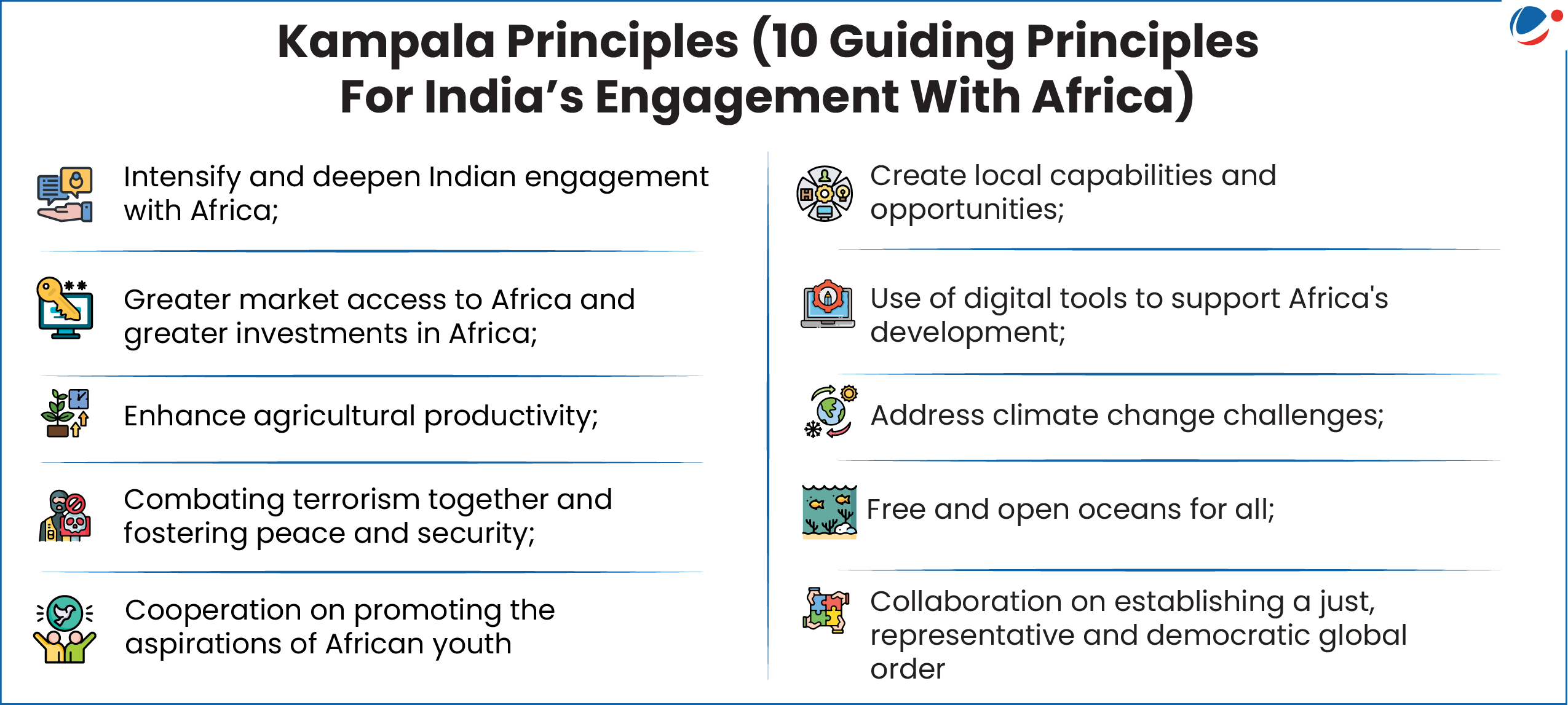Why in the News?
Prime Minister of India completed his recent visit to African nations of Ghana and Namibia and he reiterated that "Africa's goals are India's priority".
More on the News
- Prime Minister also addressed a special session of the Parliament of Ghana and was conferred the national honour of Ghana - Officer of the Order of the Star of Ghana - by the President of Ghana.
- He also welcomed the establishment of the Ghana-India Parliamentary Friendship Society which indicates a commitment to fostering closer ties at the legislative level.
- Both sides also agreed to elevate ties to a Comprehensive Partnership.
- India's Africa policy builds on old ties and focuses on present needs. It follows a consultative, demand-driven approach, working as equal partners under the Kampala Principles (refer infographic) highlighted by the Prime Minister of India in 2018.
Strategic significance of Africa for India
- Strategic and Geopolitical: Africa is natural partner of India in voicing the concerns of global south, advocating for reforms in multilateral institutions like UN and WTO, and promoting peace and security.
- E.g., African Union's (AU) G20 membership, representing voice of global south, and Asia-Africa Growth Corridor (AAGC).
- AAGC was established in 2017 by India and Japan to foster sustainable and inclusive development in Africa through enhanced connectivity and cooperation between Asia and Africa.
- E.g., African Union's (AU) G20 membership, representing voice of global south, and Asia-Africa Growth Corridor (AAGC).
- Defence: India and African countries are increasing their engagement through regional organizations like Indian Ocean Rim Association (IORA) and Indian Ocean Commission (IOC) and partaking in multinational maritime exercises like MILAN and Cutlass Express.
- Indian Navy recently launched a large-scale multilateral maritime engagement exercise with African Countries, titled as Africa India Key Maritime Engagement (AIKEYME).
- Economic: Africa offers a young, rapidly urbanising market and critical minerals (cobalt, manganese, rare earths) vital for India's manufacturing and green transition.
- Africa accounts for 48.1% of cobalt and 47.7% of manganese.
- India is Africa's third-largest trading partner (after EU and China).
- Trade Basket: Mainly includes mineral fuels, food products, pharmaceuticals, and so on from the Indian side and crude oil, diamonds, copper, etc., from the African side to India.
- Market Access: India is the first developing country to provide non-reciprocal duty-free market access to Least Developed Countries (LDCs) through its Duty-Free Tariff Preference (DFTP) scheme.
- India's Soft Power Diplomacy: Indian Technical and Economic Cooperation and Indian Council for Cultural Relations (ICCR) scholarships, along with the e-VidyaBharati & e-ArogyaBharati (e-VBAB) tele-education/ tele-medicine network, are signature capacity-building platforms spanning dozens of African countries.
- Technology: Digital connectivity is emerging as a new pillar with sharing of India Stack technologies with the African Nations such as the launch of UPI/ RuPay in Mauritius.
- Energy Security: Africa has significant potential in renewable energy with 10 TW of solar capacity, 100 GW of wind capacity, and 15 GW of geothermal energy.
- International Solar Alliance co-founded by India targets mini-grids and distributed solar in Africa through pilot projects and financing mechanisms (e.g., Global Solar Facility, STAR-C Initiative, Virtual Green Hydrogen Innovation Centre, etc.)

Concerns in India-Africa relations
- Delays in project execution and delivery: Multiple India-funded infrastructure and capacity-building projects have faced delays due to procedural bottlenecks, funding disbursement issues, and logistical challenges in remote African regions.
- Underrepresentation in Global Governance: African nations continue to lack permanent representation in the UN Security Council and other global decision-making forums.
- Strategic competition from other partners: India's focus on capacity-building and concessional LoCs, while appreciated, sometimes struggles to match the speed, scale, and deep-pockets of China.
- Security and political instability: Political unrest, conflict, and terrorism in parts of Africa, especially the Sahel and Horn of Africa, raises safety concerns for Indian workers and investments.
Conclusion
Traditionally, the African continent has played a central role in India's foreign policy with India having important stakes in the Africa. By focusing on capacity-building, local ownership, and partnership, and increasing goodwill via moral diplomacy, India hopes to create a long-term, sustainable, post-colonial model of South-South cooperation, with less dependency and more dependability.





